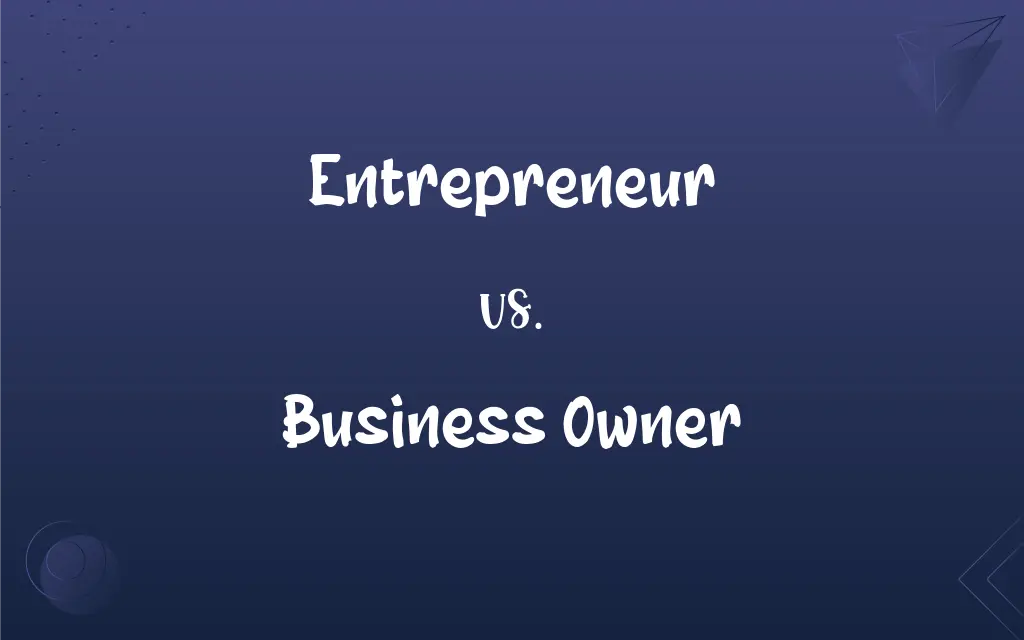Entrepreneur vs. Business Owner: What's the Difference?
Edited by Aimie Carlson || By Janet White || Published on November 26, 2023
Entrepreneur; Innovates and takes risks to start businesses. Business Owner; Owns and operates a business.

Key Differences
An entrepreneur is characterized by innovation and risk-taking. A business owner focuses on managing and sustaining a business.
Entrepreneurs often seek to disrupt markets. Business owners may prioritize stability in existing markets.
The journey of an entrepreneur can involve multiple ventures. A business owner might focus on one enterprise.
Entrepreneurs are often associated with startups. Business owners could run any type of business, including established ones.
Entrepreneurship involves a mindset of growth and change. Business ownership revolves around control and responsibility.
ADVERTISEMENT
Comparison Chart
Focus
Innovation and risk-taking
Managing and sustaining business
Market Approach
Often seek to disrupt markets
Prioritize stability in markets
Ventures
Involved in multiple ventures
Might focus on one enterprise
Association
Often with startups
Can be any type of business
Mindset
Growth and change
Control and responsibility
ADVERTISEMENT
Entrepreneur and Business Owner Definitions
Entrepreneur
An entrepreneur creates businesses from ideas.
“As an entrepreneur, he turned his passion into a profitable venture.”
Business Owner
A business owner operates and manages a company.
“The business owner ensured her store ran smoothly.”
Entrepreneur
An entrepreneur innovates to start new businesses.
“The entrepreneur’s tech startup revolutionized the industry.”
Business Owner
Business owners hold ownership of enterprises.
“As a business owner, he was proud of his family-run restaurant.”
Entrepreneur
Entrepreneurs seek growth and opportunities.
“The entrepreneur expanded her business internationally.”
Business Owner
Business owners manage daily operations.
“The business owner handled the logistics of her delivery service.”
Entrepreneur
Entrepreneurs take risks to realize their visions.
“The entrepreneur invested her savings to launch the app.”
Business Owner
Business owners bear responsibility for their ventures.
“As a business owner, she was responsible for her employees’ welfare.”
Entrepreneur
Entrepreneurs often disrupt markets with innovations.
“The entrepreneur’s new service disrupted the traditional market.”
Business Owner
Business owners often seek market stability.
“The business owner valued steady growth over rapid expansion.”
Entrepreneur
A person who organizes, operates, and assumes the risk for a business venture.
Entrepreneur
A person who organizes and operates a business venture and assumes much of the associated risk.
Entrepreneur
A person who organizes a risky activity of any kind and acts substantially in the manner of a business entrepreneur.
Entrepreneur
A person who strives for success and takes on risk by starting their own venture, service, etc.
Entrepreneur
One who takes the initiative to create a product or establish a business for profit; generally, whoever undertakes on his own account an enterprise in which others are employed and risks are taken.
Entrepreneur
Someone who organizes a business venture and assumes the risk for it
FAQs
What is a business owner?
A business owner owns and operates a business.
Is every business owner an entrepreneur?
Not necessarily, as entrepreneurship involves more risk-taking and innovation.
What defines an entrepreneur?
An entrepreneur is defined by innovation and risk-taking.
Can an entrepreneur be a business owner?
Yes, an entrepreneur can become a business owner.
Do entrepreneurs always start new businesses?
Typically, entrepreneurs start new businesses, but they can also innovate within existing ones.
Can entrepreneurs work in teams?
Yes, entrepreneurs can collaborate, although they often lead initiatives.
Are business owners always independent?
Many are, but business owners can also form partnerships or corporations.
Is failure part of being an entrepreneur?
Yes, failure and learning from it are often part of the entrepreneurial journey.
Do business owners need to innovate?
Innovation can benefit business owners, but it's not always the focus.
What’s important for a business owner?
Stability, control, and sustained profitability are important for business owners.
Can business owners be risk-averse?
Yes, business owners can be more risk-averse, focusing on stability.
Can entrepreneurship be taught?
Elements of entrepreneurship can be taught, but much is learned through experience.
Do business owners always manage day-to-day operations?
Generally, business owners are involved in daily management, but the extent can vary.
Are entrepreneurs always involved in startups?
Often, but entrepreneurs can also innovate in established sectors.
Is long-term vision important for business owners?
Yes, business owners need a long-term vision
Is funding necessary for entrepreneurship?
Funding is often crucial, but entrepreneurs can also bootstrap their ventures.
What drives an entrepreneur?
Entrepreneurs are driven by innovation, growth, and often a desire to disrupt.
Do business owners need formal education?
Formal education can help, but practical experience is often key for business owners.
About Author
Written by
Janet WhiteJanet White has been an esteemed writer and blogger for Difference Wiki. Holding a Master's degree in Science and Medical Journalism from the prestigious Boston University, she has consistently demonstrated her expertise and passion for her field. When she's not immersed in her work, Janet relishes her time exercising, delving into a good book, and cherishing moments with friends and family.
Edited by
Aimie CarlsonAimie Carlson, holding a master's degree in English literature, is a fervent English language enthusiast. She lends her writing talents to Difference Wiki, a prominent website that specializes in comparisons, offering readers insightful analyses that both captivate and inform.






































































